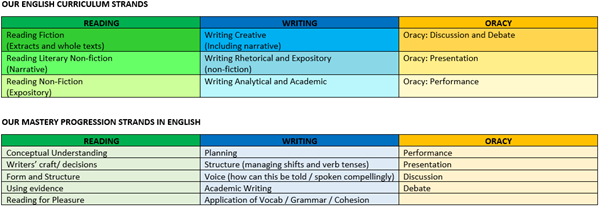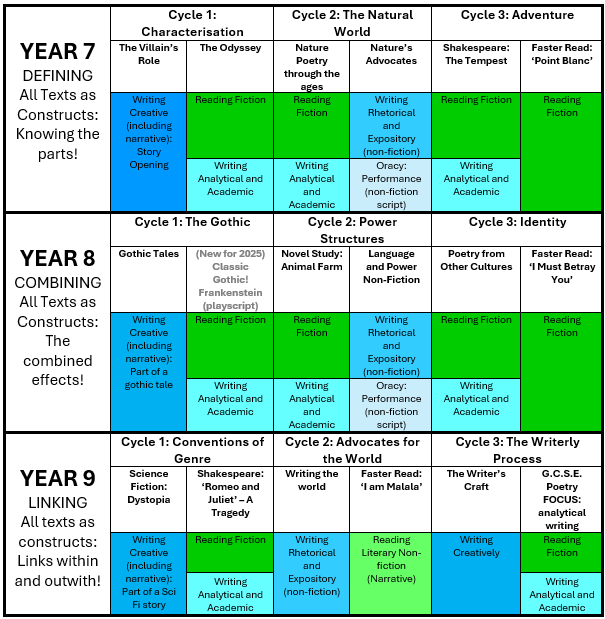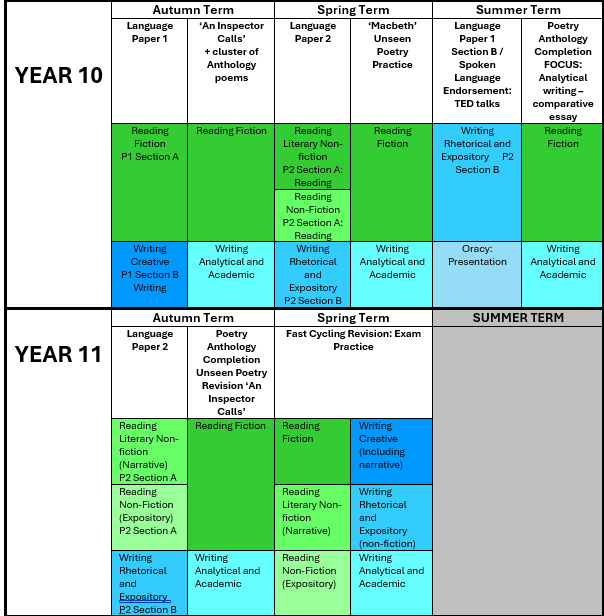
News - 14th May 2025
“The overarching aim for English in the national curriculum is to promote high standards of language and literacy by equipping pupils with a strong command of the spoken and written language, and to develop their love of literature through widespread reading for enjoyment.”
OUR ENGLISH VISION AT ST PETER’S
To create courageous advocates who have a passion and a power to be able to express themselves confidently and share their thinking about their own work and the work of others.
To encourage imaginative and creative young people who are keen to explore and evaluate the world around them and share ideas about changing the world into a better place.
To enthuse and motivate all our young people to read, write and speak using a wide range of texts spanning cultures, contexts, heritage and genres.
OUR ENGLISH STRANDS AT ST PETER’S

OUR TOP 7 PEDAGOGICAL APPROACHES
We are committed to implementing an ambitious curriculum:
- Using Model Texts at the fore of our teaching: reading to writing process
- Actively teaching Planning for Impact in our writing
- Approaching texts using the Writerly Knowledge Method
- Teaching Vocabulary Explicitly: conceptual, analytical and nuanced
- Embedding Purposeful Talk as a tool for learning and exploring
- Providing a Scaffolded Approach towards Independence
- Practicing Metacognitive Strategies in all areas of our discipline
KEY STAGE 3 ENGLISH
In English we return to the same skills again and again, but we are clear how we want our students to make progress from when they join us in Year 7, right through to the end of their journey with us at the end of Year 11. As part of our curriculum mapping process, we pulled these ideas together in order to share our vision of what we hope students will master by the end of each year in years 7 – 9 so they are fully ready for their GCSE curriculum in Year 10.


The Key Stage 3 curriculum aims to ensure that all pupils:
KNOWLEDGE AND SKILLS AT KS3
READING: We want our students to be able to make an informed personal response to any text, recognising that other responses to a text are possible and to be able to evaluate these. We aim for them to develop their independence when responding to texts (both studied and unseen): they need to be able to infer, comment on, explain, analyse, evaluate and compare. Through our vocabulary work, we hope students are able to pinpoint and explore challenging conceptual ideas, as well as talk and write about texts critically, using a sophisticated, academic style when appropriate.
Develop an appreciation and love of reading, and read increasingly challenging material independently through:
Understand increasingly challenging texts through:
Read critically through:
WRITING: We want our students to know and understand a variety of genres and the appropriate grammar and methods to construct these texts convincingly. It is important students are able to apply this knowledge and these key skills independently in a variety of context across a range of text types. Students must be able to adapt and subvert texts; plan, draft, edit and proof read their writing; develop their vocabulary to be convincing and sophisticated.
Write accurately, fluently, effectively and at length for pleasure and information through:
Plan, draft, edit and proofread through:
GRAMMAR AND VOCABULARY: Over the past 5 years, we have focused significantly on the importance of vocabulary, as a whole school and within the English department. We use a wide range of strategies, including one of our home-learning platforms (Readingwise) to develop vocabulary competence amongst our young people.
Consolidate and build on their knowledge of grammar and vocabulary through:
SPEAKING: We are passionate about helping students to realise the power of their individual voice as an advocate for change in the world and a skill which is vital in our day to day personal and working lives. Students have to be able to formulate, develop and articulate ideas with increasing confidence, fluency and sophistication in a range of contexts, knowing when it is important to use standard English and more formal vocabulary and structures. We promote high-quality speaking through performance, frequent discussion and debate, and presenting ideas in the format of a speech.
Speak confidently and effectively, including through:
KNOWLEDGE AND SKILLS AT KEY STAGE 4
READING: We want our students to be able to make an informed, personal response to any text, recognising that other responses to a text are also possible, and to be able to evaluate these. We aim for them to develop their independence when responding to texts (both studied and unseen): they need to be able to infer, comment on, explain, analyse, evaluate and compare. Through our vocabulary work, we hope students are able to pinpoint and explore challenging conceptual ideas, as well as talk and write about texts critically, using a sophisticated, academic style when appropriate.
Read and appreciate the depth and power of the English literary heritage through:
Understand and critically evaluate texts through:
WRITING: We want our students to know and understand a variety of genres and the appropriate grammar and methods to construct these texts convincingly. It is important students are able to apply this knowledge and these key skills independently in a variety of context across a range of text types. Students must be able to adapt and subvert texts; plan, draft, edit and proofread their writing; develop their vocabulary to be convincing and sophisticated.
Write accurately, fluently, effectively and at length for pleasure and information through:
Make notes, draft and write, including using information provided by others [e.g. writing a letter from key points provided; drawing on and using information from a presentation]
Revise, edit and proof-read through:
GRAMMAR AND VOCABULARY: Over the past 5 years, we have focused significantly on the importance of vocabulary, as a whole school and within the English department. We use a wide range of strategies, including one of our home-learning platforms (Readingwise) to develop vocabulary competence amongst our young people.
Consolidate and build on their knowledge of grammar and vocabulary through:
SPEAKING: We are passionate about helping students to realise the power of their individual voice as an advocate for change in the world and a skill which is vital in our day to day personal and working lives. Students have to be able to formulate, develop and articulate ideas with increasing confidence, fluency and sophistication in a range of contexts, knowing when it is important to use standard English and more formal vocabulary and structures. We promote high-quality speaking through performance, frequent discussion and debate, and presenting ideas in the format of a speech. We weave oracy and spoken language elements throughout our curriculum from year 7 right through to year 11. As the GCSE Spoken Language Endorsement we ask students to write and present a TEDTalk style speech, enabling student to really find their voice, their passion and speak out about something they feel will make a positive difference within the world.
Speak confidently, audibly and effectively, including through:
ASSESSMENT IN ENGLISH
We assess regularly in English through our ongoing day-to-day monitoring of class work, with teachers providing students with live feedback. We use this information to adapt our teaching and ensure our students are making progress. Every unit, apart from our faster reads, has a mid-cycle checkpoint and a final assessment, which enables students to demonstrate, and teachers to assess, the skills and knowledge we have specifically been teaching within the unit. All units have clearly identified core curriculum strands so it is clear how they fit into the bigger learning journey from Year 7 to Year 11, as well as other subsidiary but important strands, ensuring breadth of coverage and repeated rehearsal of key skills in new contexts as our learners progress in English at St Peter’s.
GROUPING IN ENGLISH
We are currently in the process of moving towards mixed ability teaching, and our current grouping structure varies a little between different year groups. We understand that grouping can be is important to students, parents and staff, and we use our knowledge of effective practice, drawing on research, as well as our understanding of the needs and mix within a cohort, when making grouping decisions. We aim to stretch and challenge all our students, in every group, and are always developing our practice to ensure all students are supported to make excellent progress. Our shift to a mixed ability approach is based on robust research, as well as analysis of our internal data.
Year 7
Groups are currently in tutor groups, which are completely mixed ability. In each population (W, X and Y) there is one smaller group which falls within the DELL provision, specifically to support students who have identified literacy needs.
Year 8
English groups in Year 8 are mixed ability. In each population (W, X and Y) there is one smaller group which falls within the DELL provision, specifically to support students who have identified literacy needs.
Year 9
English groups in Year 9 are mixed ability. In the Q population there is one additional smaller group who follow an alternative English pathway, specifically designed to support a small number of students who have identified literacy needs.
Year 10
This year in Year 10 we have we have one higher attaining group and 4 mixed groups in each population (P and Q). Within each mixed group there will be several high attaining students and some students who will need specific support from the teacher. There is one smaller provision in the Q population, which is an alternative English pathway, specifically designed to support a small number of students who have identified literacy needs.
Year 11
This year in Year 11 we have we have two higher attaining group (P and Q) and 3 mixed groups in each population. Within each mixed group there will be several high attaining students and some students who will need specific support from the teacher. There is one smaller provision in the Q population, which is an alternative English pathway, specifically designed to support a small number of students who have identified literacy needs.
HOME LEARNING IN ENGLISH
We set weekly homelearning for all year groups in English which is designed to deepen understanding of key texts, practice key skills in writing and develop writing stamina, increase a range of reading skills and expand students’ vocabulary proficiency.
Year 7 and 8
Weekly wider reading or writing
Students are expected to read or write at home for at least half an hour each week. Their homework will either be to read and then their ‘reading journal’ or to complete a task as part of their ‘writing journal’. We will alternate between reading and writing throughout the year.
Half termly vocabulary
Students are set vocabulary work to do using the Readingwise platform. The vocabulary will be linked to the unit and skills students are focused on in their English lessons during that cycle. This homelearning is set as ‘tasks’ on Readingwise and students can track their progress towards completion. We recommend students do frequent short bursts on Readingwise, as research shows this is the most effective way to build and sustain vocabulary proficiency.
Year 9, 10 and 11
Weekly writing
Students are expected to complete a writing task each week at home. These are set on Google Classroom. The writing tasks will vary across the year, covering all modes of writing necessary to succeed in English exams, including creative and narrative writing, persuasive and expository writing, and analytical, academic writing. They are expected to write a minimum of one side of A4, and are also asked to review and reflect on this piece of writing as part of the task. As students move towards their exams, these will more frequently be past paper questions.
Literature Homelearning
Students have weekly literature homelearning, as the study of literature is a separate GCSE. In Year 9, this is focused on helping students develop their understanding of literature as a subject, the conventions of certain text types and genres, and the terminology that will enable them to respond critically to any text. In Years 10 and 11, this is designed to secure their knowledge of their core literature texts. Literature homelearning will usually take one of the following formats:
Vocabulary
Students are set half termly vocabulary work to do using the Readingwise platform. The vocabulary is linked to the unit and skills students are focused on in their English Language or Literature lessons during that half term, or to aid revision of a core text. This homelearning is set as ‘tasks’ on Readingwise and students can track their progress towards completion. We recommend students do frequent short bursts on Readingwise, as research shows this is the most effective way to build and sustain vocabulary proficiency.
STAFFING IN ENGLISH
| Subject Documents |
|---|
| AQA English Language and Literature course outlines |
| English Curriculum Map 24.25.26 |